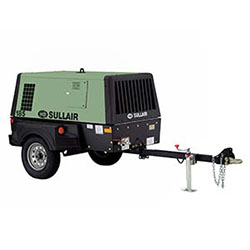
What You Need to Know Before Renting an Air Compressor
Category: Rental
Air compressors are essential pieces of equipment at jobsites such as construction, agriculture, mining and forestry. They provide the pressurized air that’s required for operating various types of power tools and equipment. Air compressors also eliminate the need to drag big, bulky motors to and from remote worksites.
If yours is like many industrial operations, you may only need air compressors on a temporary basis, such as for a short-term project or supplementing your equipment fleet to meet a surge in demand. In these situations, it often makes more sense to rent rather than purchase a unit. The following provides an overview of what you need to know before renting an air compressor for your business:
- Type: There are two basic types of air compressors: rotary screw and piston/reciprocating. Rotary screw compressors feature interlocking twin screws that turn inside a chamber to pressurize the air. Because they do not require storage tanks, rotary screw compressors are the best choice for continuous-duty applications. Reciprocating compressors use the movement of pistons to pressurize the air inside a storage tank. They’re often the better choice for smaller applications, such as powering hand tools, paint guns and nail guns.
- Portability: While you can rent stationary air compressors, companies working at remote jobsites often require portable units. However, some portable compressors offer more mobility than others. For example, a larger rotary screw model may be skid-mounted, which will require a pallet jack to load and unload it from a truck and transport it around the jobsite. On the other hand, a smaller reciprocating unit is often light enough to wheel or even carry around the site.
- Size: Air compressors have two size measurements to consider: cfm (cubic feet per minute) and psi (pounds per square inch). To determine the right size for your applications, add up the cfm requirements for your tools of choice while ensuring the compressor meets your psi requirements. For example, if you’ll be using a jackhammer (75 cfm) and a chipper (30 cfm), you’ll need a compressor that can deliver a minimum of 105 cfm and 100 psi.
- Tank size: If you select an air compressor with a storage tank, make sure it provides a sufficient air storage capacity to meet your needs. Tanks range in size from 1 to 80 gallons. A 60-gallon tank is usually adequate for continuous use applications, while a 5-gallon tank is probably enough when you need an intermittent air supply.
- Hoses: Be sure the hoses that come with the air compressor are rated for the pressure and temperature of your application. Keep in mind that hoses typically lose psi as they extend farther from the compressor. If you plan to work at a significant distance from the compressor, consider renting a model with a higher psi capacity.
NMC The Cat Rental Store offers a wide assortment of portable and stationary air compressors you can rent for a day, week or month. We also have the expertise to help you select the right model for your applications. Contact us to learn more today.
Contact Us
